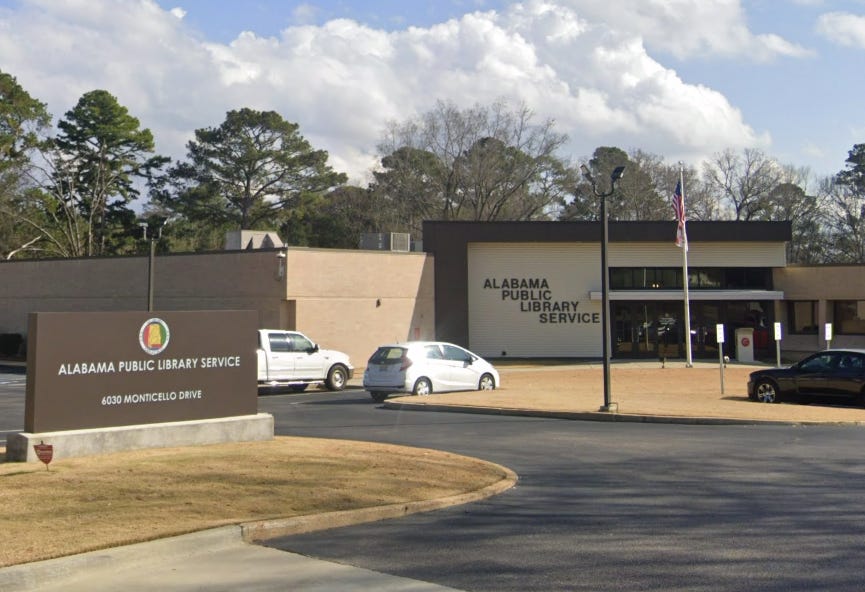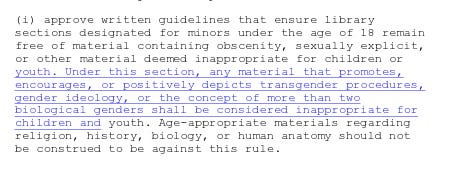"Positive Depictions" Of Trans People Banned In Alabama State Libraries Proposal
The code change that has been proposed does not ban negative depictions of transgender people, however. Public comment is open until October 14.
Over the last four years, LGBTQ+ people—especially transgender people—have been attacked from every angle: bans on healthcare, restrictions on bathrooms, even attempts to restrict driver’s license gender markers. But one of the earliest and most revealing features of this backlash was the push to strip books about queer and trans lives from classrooms and libraries. At first, these bans cloaked themselves in neutrality, prohibiting vague “gender and sexuality” discussions—rules that always seemed to allow depictions of straight marriage while quietly targeting anything queer. Now, the mask is off. The Alabama Public Library Service has issued a proposal that would force libraries to pull any “positive depictions” of transgender people from general shelves and relegate them to the adult section.
The proposal is buried in a section on explicit content and obscenity. Alongside pornography and graphic material, a new provision tells libraries what they cannot make available to anyone under 18. It reads (emphasis added): “Under this section, any material that promotes, encourages, or positively depicts transgender procedures, gender ideology, or the concept of more than two biological genders shall be considered inappropriate for children and youth.” In other words: positive depictions of transgender people are forbidden, while negative depictions remain perfectly acceptable.
The regulation, pushed by anti-LGBTQ+ groups like Clean Up Alabama, is a transparent attempt to dictate what young people are allowed to read. Earlier bans in the state at least tried to cloak themselves in neutrality: Alabama’s 2022 “Don’t Say Gay” law, for instance, claimed to apply broadly to “sexual orientation or gender identity.” But in practice, depictions of straight couples were untouched while same-sex relationships were scrubbed from classrooms and libraries—an imbalance so blatant it’s led several courts to overturn such book bans. Now, that pretense has vanished. The new proposal explicitly singles out “positive depictions” of transgender people, codifying what was always the real goal.
Clean Up Alabama has already compiled a blacklist of books it wants banned under the proposal and other policies in the state, and nearly all of them are by LGBTQ+ authors or about LGBTQ+ topics. One is Calvin, a picture book about a transgender child—with no sexual content whatsoever. Another, Door by Door: How Sarah McBride Became America’s First Transgender Senator, is a simple political biography, which one challenger states “should be removed and destroyed.” Even Red: A Crayon’s Story—a book about a blue crayon mislabeled as red, meant to teach kids about resisting labels and being your own person—has made the list, despite containing no reference to gender identity at all. In other words, the campaign is less about “protecting children” from explicit content and more about purging any message of self-acceptance that doesn’t align with their ideology.
In an email to supporters, Clean Up Alabama explicitly tied the proposal to Trump’s executive orders, claiming that banning books with positive depictions of transgender people was necessary to comply with directives “affirming that there are only two sexes, male and female, as fixed realities.” The group went even further, urging the state to abandon reliance on the Miller Test—the Supreme Court’s long-standing standard for defining obscenity—when it comes to public libraries. That shift would effectively allow political ideology, not constitutional law, to dictate what young people are permitted to read.
In recent months, there has been a sweeping campaign to erase transgender people from public life. Federal policies have barred transgender people from obtaining passports with accurate gender markers, threatened to strip funding from institutions that acknowledge their existence, and pulled millions of dollars from research on transgender healthcare. School districts have even been told that free lunch money for poor children could vanish if they allow transgender students to use the bathroom. The censorship extends to history itself: Stonewall National Monument, which once commemorated “LGBT rights,” has been scrubbed of the “T,” recasting the event as a fight for “LGB rights” and erasing the transgender people who were leaders there. Censorship has become a central tool of the far right—and Alabama is now taking it to a whole new level.
The fight over Alabama’s library codes is not going unchallenged. Groups like the Alabama Transgender Rights Action Coalition and Read Free Alabama are mobilizing against the proposed restrictions. They’ve laid out clear steps for residents who want to resist: submit written letters to the Alabama Public Library Service directly, request to speak at the September 18th or October 21 hearing in Montgomery, or use Read Free Alabama’s tool to automatically send a pre-written letter to the board.




When someone eventually writes a definitive history of trans erasure/knowledge suppression, I think EITM is going to be a valuable resource.
On a side note, I'm a medievalist at heart, and when I see modern attacks on trans people I'm constantly reminded how little conservative/religious attacks on trans people have changed. For example, Early Medieval pastoral literature and edicts often condemn gender non-conformity with dehumanizing and genocidal language. Conservatives who think trans people are a product of a "woke mind virus" that flared up c. 2010 probably have no idea that the rhetoric they spew towards us has been going on for thousands of years. Or maybe they do and simply don't acknowledge it because that would mean admitting that we've always been here, undermining their entire "wokeism" thesis.
WTF? These people are completely psychotic. They want reality to conform to their beliefs. That is freaking dangerous, and others that they are delusional about, it could even jeopardize the future of humanity and the biosphere.